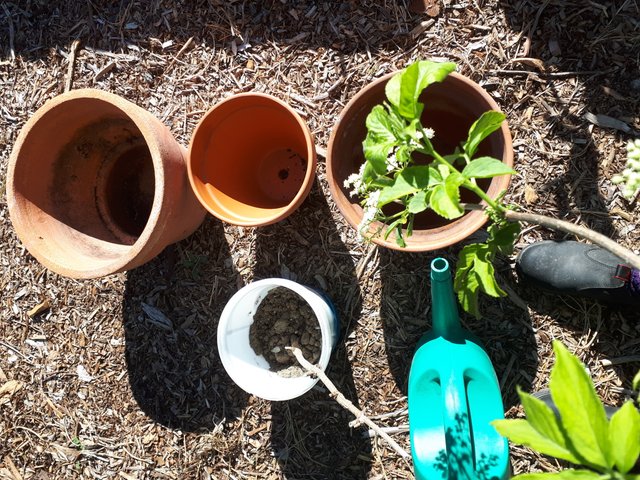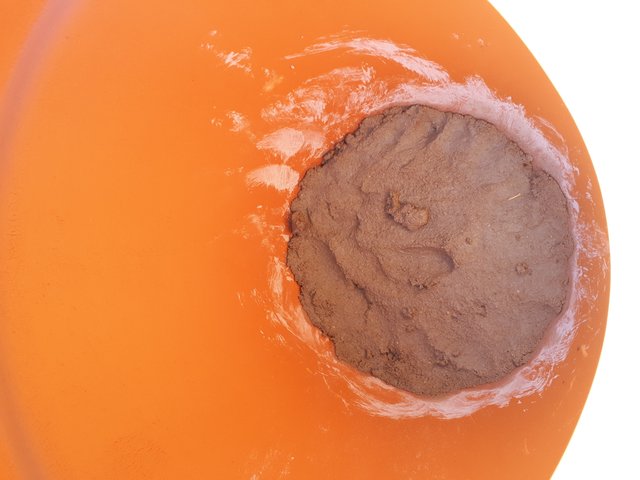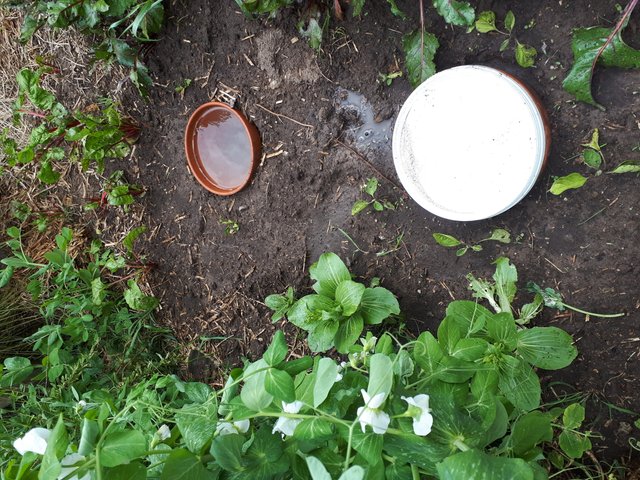Homemade Ollas: Thinking About Water Use in The Garden Part 2
One of the things I love about gardening is that it requires creative practice for problems. In my post on water a few days ago, I mused about water as a resource, and how I was thinking about ways to prepare my garden for coming dry weather. I wrote that:
I was determined that I was right - that there was FAR more water wasted on products and services than would be wasted on my vegetables. Research found that for every dollar spent at the supermarket, you could count on 28 litres of water being embedded in these products. Production, agriculture, packaging, transport - they were using far more water than I was using to grown my own organic vegetables. Agricultural is response for about 80 percent of all water used.
These reflections on water as a precious commodity, and worry about the possibility of drought, led me to something I'd never heard about before - ollas!
Ollas are unglazed clay - or terracotta - pots used for water irrigation. They're used most often in Brazil, Iran and India, and I'm wondering why we don't use them here! You'll find a really comprehensive article here if you'd like to hear more about their use in permaculture.

Image Source
The article informs us that:
The microporous (unglazed) walls that do “not allow water to flow freely from the pot, but guides water seepage from it in the direction where suction develops. When buried neck deep into the ground, filled with water, and crops planted adjacent to it, the clay pot effects sub-surface irrigation as water oozes out of it due to the suction force which attracts water molecules to the plant roots. The suction force is created by soil moisture tension and/or plant roots themselves.” (AE Daka – 2001.) The plant roots grow around the pots and only “pull” moisture when needed, never wasting a single drop. “Ollas virtually eliminate the runoff and evaporation common in modern irrigation systems, allowing the plant to absorb nearly 100 percent of water.” (City of Austin Water Conservation, 2006.) To use ollas in a garden or farm, one buries the olla in the soil leaving the top slightly protruding from the soil (ideally the neck of the olla is glazed to prevent evaporation or it should be reasonable to apply a surface mulch that covers the neck of the olla without spilling into the opening). The olla is filled with water and the opening is then capped (with a rock, clay plate or other available material to prevent mosquito breeding, soil intrusion and evaporation).
Wow. That's pretty cool! It means that you can ensure a water supply to your plants, especially young seedlings which can really suffer if you get a dry day and forget to water! You can also add fertilizer to the ollas for slow release nutrients. The use of ollas and their size will depend on whether you're using a container or what type of plants you have.

Image from Permaculture News online.
Of course, not living in Brazil or India, I wondered how I'd get access to ollas pots, whereupon I stumbled on this brilliant little gem:
She uses ordinary terracotta pots with the saucer as a lid, and blu tac to prevent the water coming out. This did NOT work for me - perhaps I didn't clean the bottom of the pot very well. In the end, I took three old terracotta pots that were lying around, and mixed up some concrete and placed at the bottom of the pot.


Too easy, right? Then, I dug holes and placed them where I was planting some eggplant and capsicum. I didn't have saucers, but I used lids from some gallon buckets that worked well. I imagine a rock or any kind of covering would work fine, and as the plants grow up, I'll mulch over the top of it to prevent further evaporation.

I'm really interested to see how long water will last in these pots on a hot day, and I'm interested to see how this will go in comparision to the wicking beds (I'll talk about these in another post) - basically, I'm setting up a garden experiment so that I have the same plant growing in 3 situations - no method (just mulch and the hose), the ollas, and the wicking beds. By the end of summer, I'll be able to tell you how they went!
This particular post was written in response to @elamental's Earth Deeds initiative, which you can find here. @elamental writes:
I challenge everyone to start documenting their Earth conscious efforts on Steemit in a short post AT LEAST once a week. The more of us that show the rest of the world how easy it is to help the environment, the more people will also start taking action in their every day lives, and the impact you have with your otherwise "small" eco-friendly actions, will become even greater.
It's a great initiative and I encourage you to consider what you are doing to make a small difference on both local and global environments, write about it, and use the hashtag #earthdeeds so we can all find each other.

If you're a supporter of all things natural healing, you might like to read our introductory post here. We'd also love to welcome you on Discord here!!
 |  |
|---|
You just planted 0.10 tree(s)!
Thanks to @nateonsteemit
We have planted already 4825.60 trees
out of 1,000,000
Let's save and restore Abongphen Highland Forest
in Cameroonian village Kedjom-Keku!
Plant trees with @treeplanter and get paid for it!
My Steem Power = 20509.97
Thanks a lot!
@martin.mikes coordinator of @kedjom-keku
@nateonsteemit this is great THANKS XXX you are such a great person!
Posted using Partiko Android
It's a tiny swale!!! 😍😍😍😍
Wow, I love that! Can't wait to see how it works for you :D
@buckaroo, check this out! It may be a help for you in your drought!
Hey cool huh??? Saying this after a great downpour in last 24 hours!!! Drought not 100 percent certain but definitely summer will get dry. But yeah @buckaroo could be worth looking into??
Posted using Partiko Android
That's very interesting @riverflows!
I am living in an area that the past few years is entering in a drought period and water is always my concern. I'll try this out in small scale to see how it works here with the pots I can find.
Thank you for sharing!
I used to see Olla (in Arabic Ollah) at my grandparents'. But instead of being used in agriculture, They were being used for cooling and filtering drinking water. The water is poured into the ollah which is placed in a large pot. Then you drink the water that seeps to the pot. It used to taste fresh and cool even in hot summer.
They were being made of burnt clay and it is said to be first used by Pharaohs. I don't remember seeing any of them over almost the past 20 years, except for a visit to Fayoum Pottery school where they are produced for decoration.
Ohhhh so do you think the word is Arabic!!!! I was wondering today. And yeah we have heard of these cooling systems before! Brilliant xxx
Posted using Partiko Android
I was surprised you used almost the same name being used in Egypt. Even different Arabian countries use different names. According to many online English dictionaries its origin is Spanish. It is also exist in Arabic dictionaries which means it is not colloquial, but with no mentioning of the origin. I am inclined to believe that both Arabians and Spanish took it from Egyptian hieroglyphs as it was first used by Pharaohs as far as I know.
That's really cool. I love etymology!
Posted using Partiko Android
Ollas have always intrigued me! I can't wait to hear if yours work. Wicking bed is a new concept to me. Unless I don't know the term. I love your gardening experiments. I'm sure @nateonsteemit will appreciate them! Did you see the challenge to homesteaders for different projects? My response was how do you choose which?!! Loved this water post, again, @riverflows
Oh I will check that out for sure... thanks!!! I'll be posting a DTUBE on wicking beds this weekend for you!!!
Posted using Partiko Android
Yeah! Keeping my eyes peeled. I'm very curious
Having dealt with constant standing water this year and the attendant mosquitoes, my first thought on the ollas was to cover the top of the neck with fine screening to keep the mosquitoes from breeding. If using flowerpots, the cover would work.
Oh gosh yes kids for sure!!! Absolutely. We have mosquitos here too. Very important to cover!!!
Posted using Partiko Android
I hear ya @goldenoakfarm! We've had a very wet year and plenty of mosquitoes so that is a good point you bought up to get them covered also so the water doesn't evaporate of course.
Oh! This is a great idea! I have lots of rain in my island but I will remember this when the dry season starts again!
Congratulations @riverflows! You have completed the following achievement on the Steem blockchain and have been rewarded with new badge(s) :
Click on the badge to view your Board of Honor.
If you no longer want to receive notifications, reply to this comment with the word
STOPDo not miss the last post from @steemitboard:
Love it River! This is something I will have a hard time remembering to do in our garden next spring, but I will try! Thought if it's as rainy as it was this year I won't need it. I never heard of the 8 year drought.. that's crazy! Better be ready for it again, even here.
It looks like it should work just fine. You put concret at the bottom of the pot you said? I guess it looks like clay, but that wouldn't work with clay.
Thanks and I hope it will be good for the summer!
Good stuff to know to prepare for drought! So far we have been having very wet years but I might try them in my covered garden for it doesn't get the natural rainfall. I tried another idea that was similar to this with repurposing 1 liter bottles that you placed a spike on that had holes for the water to slowly drip out of to your plants. It worked okay but I like this idea better. I have more clay posts than plastic bottles.
You may as well use what you have. And you can use them inside too!
Posted using Partiko Android
True!